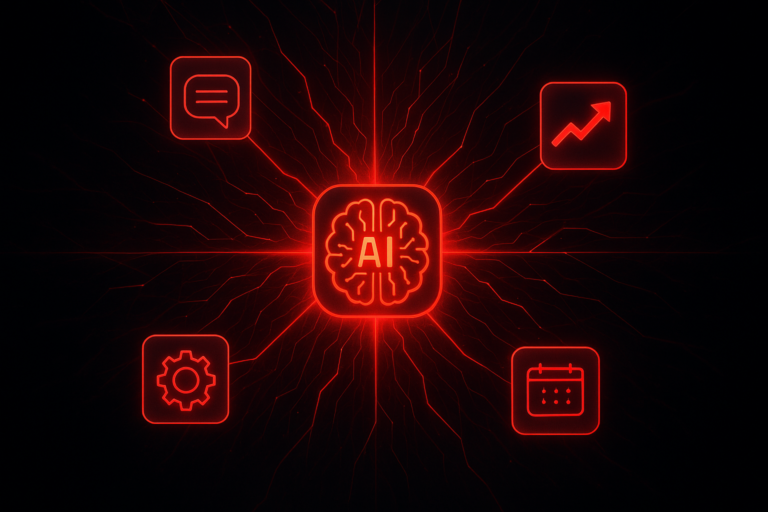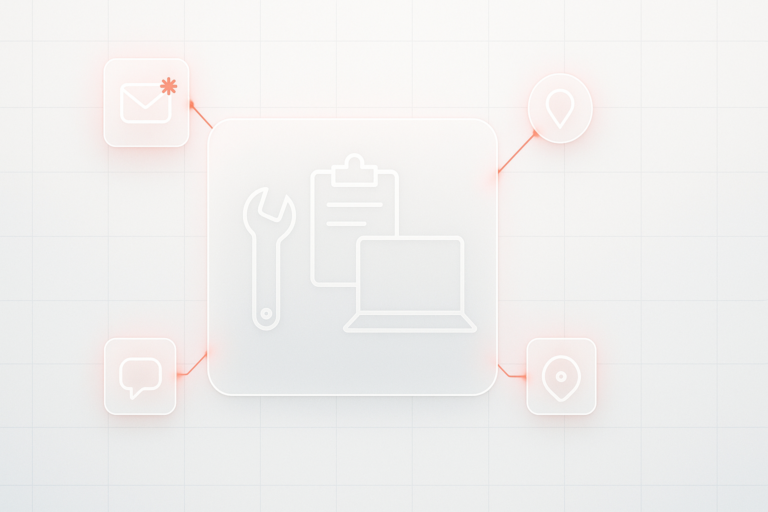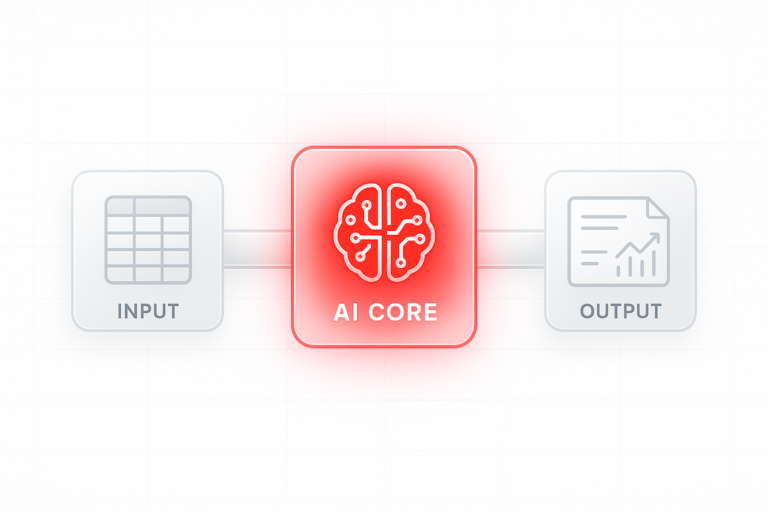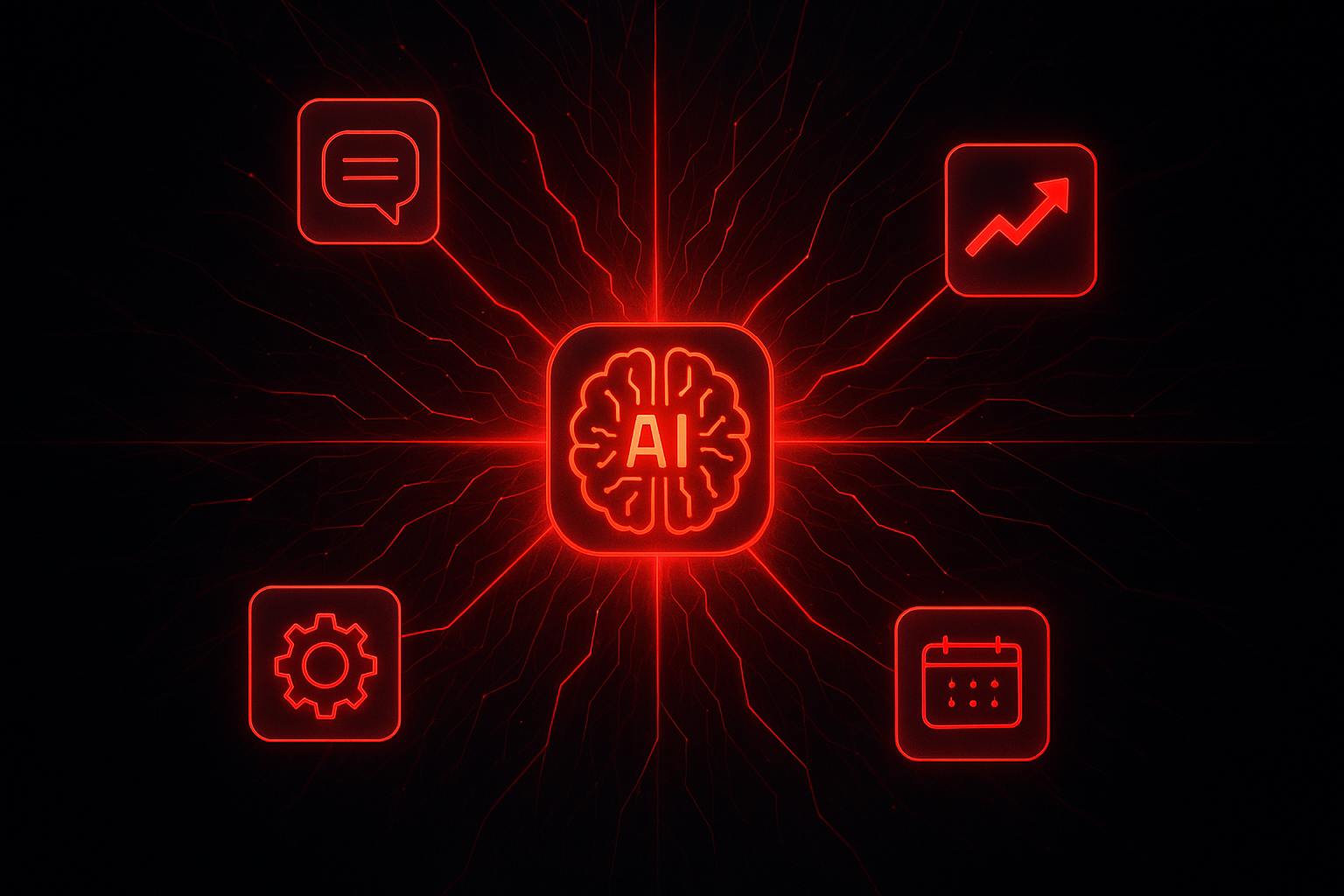
- Ai Growth, Blog
- By Grahame Simpson
AI for Small Business: Smarter Tools for Time, Money, and Growth
Introduction
Artificial intelligence (AI) is everywhere in the headlines — but what does it really mean for small businesses, consultants, or trades?
For many, AI still feels futuristic, maybe even intimidating. But here’s the reality: you already use AI every day. Autocorrect on your phone. Spam filters in your email. Google Maps predicting traffic on your commute. These aren’t science fiction — they’re practical tools quietly making life easier.
The same is true for business. AI isn’t here to replace you or take over your work. It’s here to help — to save time, cut costs, and handle the repetitive tasks that eat up your day. Think of it as an extra tool in the toolbox, one that levels the playing field and gives small businesses the kind of support only big companies could afford in the past.
This article looks at what AI really is (in plain English), why it matters for businesses of every size, and where it can make an immediate difference today.
Contents
In this article, we’ll cover:
- What AI really is (in plain English)
- Why AI matters for businesses of all sizes
- Where AI can help right now
- Busting the myths about AI
- The human side of AI
- How Smart Progress is exploring AI
- Why start exploring AI now
- Conclusion
What AI Really Is (in Plain English)
Let’s strip away the jargon. AI is simply software that learns from data and uses it to predict, create, or automate tasks.
That might sound technical, but you’ve already seen it in action:
- Autocorrect and predictive text → Your phone “guesses” what you’re about to type.
- Spam filters → Your inbox filters out junk by recognising patterns.
- Google Maps → It predicts the fastest route based on live traffic data.
These are all AI — not robots, not sci-fi. Just smart tools that help you in the background.
Now, the same technology is being applied in ways small businesses can use directly: drafting content, managing emails, answering customer questions, even automating admin. Tools like ChatGPT, Make.com, and simple AI-powered platforms are making these capabilities accessible to everyone, not just big corporations.
Why AI Matters for Businesses of All Sizes
For a long time, advanced technology was something only big corporations could afford. But AI has changed that. Today, a one-person consultancy or a local trades business can use the same kind of tools as a multinational — often for little or no cost.
Here’s why AI matters so much right now:
- Levels the playing field → Small businesses can compete with larger ones by being faster, more responsive, and more efficient.
- Saves time → Automates repetitive tasks that would normally eat hours each week.
- Cuts costs → Reduces wasted spend by making processes smarter and more targeted.
- Boosts productivity → Frees up your focus for higher-value work and decision-making.
And it’s not just theory. Here are some everyday examples:
- Consultant → Instead of spending an afternoon writing a proposal, AI drafts the first version in minutes, leaving you to refine it.
- Trades business → AI tools automatically send seasonal reminders (“boiler check due” or “garden maintenance time”), keeping work consistent without manual effort.
- SME service provider → AI sorts through a messy spreadsheet of leads, cleans the data, and organises it for outreach.

“Businesses adopting AI report an average 20–40% productivity improvement in certain tasks (McKinsey).”
AI isn’t about replacing people — it’s about taking the heavy lifting off their plate, so more energy goes into the work that really matters.

Where AI Can Help Right Now
The best way to understand AI is to see where it fits into everyday business tasks. Here are four areas where AI can already make a difference for consultants, trades, and SMEs:
- Lead generation → AI can help find, sort, and organise prospects. For example, instead of manually copying names from directories, an AI-powered tool can clean a list, fill in missing details, and highlight the best leads to contact first.
- Email & content → Drafting newsletters, blogs, or social posts often takes hours. With AI, you can get a strong first draft in minutes — then polish it to match your voice. That means more consistency without the time pressure.
- Customer service → Chatbots can handle FAQs, booking requests, or basic support, freeing you (or your team) to focus on higher-value conversations. Clients still get fast responses, but you don’t have to be available 24/7.
- Admin & operations → AI-powered tools can automate routine tasks like scheduling appointments, generating invoices, or even sending reminders. It reduces repetition and keeps things moving smoothly without manual effort.
These aren’t futuristic ideas — they’re things businesses are already using today. And the best part? Many of these tools are low-cost or even free, making them accessible to any size of business.
Busting the Myths About AI
Like any new technology, AI comes with plenty of myths — and they often stop small businesses from giving it a try. Let’s clear up a few of the biggest ones:
- “AI is only for big companies.”
Not true. Most AI tools are cloud-based, subscription-based, or even free at entry level. A sole trader can now access the same tech that global brands use — without the huge budgets. - “AI will replace people.”
In reality, AI works best alongside people. It handles repetitive, time-consuming tasks, while humans bring creativity, empathy, and decision-making. For SMEs and consultants, AI is more like a helpful assistant than a replacement. - “AI is too complicated.”
Many modern AI tools are built for non-technical users. If you can use email or spreadsheets, you can use AI platforms like ChatGPT, Canva AI, or automation tools such as Make.com. - “AI isn’t ready yet.”
AI isn’t perfect — but it doesn’t have to be. Even now, it can draft content, clean data, and automate admin well enough to save hours each week. The businesses already adopting it are getting ahead while others wait.
AI isn’t a threat or a fad. It’s a set of tools that, used wisely, can make running a business simpler, faster, and more profitable.

The Human Side of AI
AI is powerful — but it’s not magic. On its own, it can make mistakes, miss context, or sound a little too mechanical. That’s why the businesses that benefit most are the ones that combine AI with human judgment, creativity, and empathy.
Think of AI as a first draft, not a finished product:
- AI can write an email, but you add the personal touch that makes it feel authentic.
- AI can clean a data list, but you decide which contacts are the real priority.
- AI can answer FAQs, but you step in when a client needs reassurance or complex advice.
This partnership works because AI handles the repetitive or technical parts, while people bring the nuance that builds trust.

The future isn’t AI replacing people. It’s people using AI to do their best work, more often, with less stress.
How Smart Progress is Exploring AI
At Smart Progress, we don’t see AI as a distant idea — we’re already using it in practical ways to save time and deliver better results.
Some of the areas we’re beginning to apply AI include:
- Content creation → drafting articles, social posts, and newsletters faster, then refining them for our clients’ voice.
- Lead generation → using AI to clean and enrich prospect lists so outreach is more targeted.
- Automation → setting up simple workflows that reduce repetitive admin and keep things moving smoothly.
We’re also exploring how these tools fit together into bigger systems that make business growth simpler.
This is just the start. Our direction is to grow deeper into AI consultancy — not just using the tools ourselves, but helping SMEs, consultants, and trades understand how to apply them without overwhelm.
AI isn’t about replacing the human side of business. It’s about giving business owners more time, clarity, and consistency — things every growing business needs.
Why Start Exploring AI Now
AI is moving fast. What felt like science fiction only a few years ago is now built into everyday apps and business tools. The question isn’t whether AI will impact small businesses — it’s how quickly those businesses adapt to it.
Here’s why it pays to start exploring now:
- Low cost, low risk → Many AI tools are free or inexpensive to try. You don’t need a big budget to experiment.
- Early adopters get ahead → The businesses already using AI are saving time, improving efficiency, and reaching customers faster. Waiting means playing catch-up later.
- It compounds over time → The earlier you build AI into your processes, the more benefit you’ll see as tools improve and expand.
- Clients expect it → Faster replies, smoother processes, smarter insights — people are already experiencing AI elsewhere and expect the same level of service.

You don’t need to overhaul your business overnight. But trying small, simple AI tools today is the first step toward working smarter tomorrow.
Conclusion
AI isn’t something to fear or wait for. It’s already here, quietly powering the tools you use every day — from maps to spam filters to predictive text. For small businesses, consultants, and trades, it’s one of the simplest ways to save time, reduce stress, and create more consistent growth.
The truth is, AI won’t replace you. But it can free you from the repetitive, time-consuming work that gets in the way of your best work. Combined with human judgment and creativity, it’s a tool that makes businesses smarter, faster, and more resilient.
If you’re curious about AI, the best step is to start small. Try a tool. Automate one task. Draft one email. Each experiment shows you what’s possible — and over time, those small wins add up to a big difference.
The future of business isn’t AI replacing people. It’s people using AI to build better businesses.
Related Posts

AI for Small Business: Smarter Tools for Time, Money, and Growth

